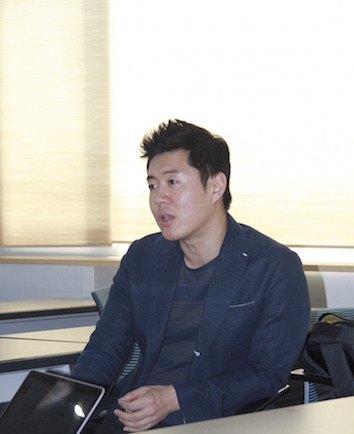
Mr. Jeon is a celebrity in the Korean startup scene in his own right; he not only is the CEO of a massively successful business that launched several domestic Online to Offline (O2O) dining platforms, but also has been the mentor and judge in a KBS startup reality show. On top of that, he used to be a TV anchor on Maeil Business News, produced various independent films and published a book. Upon his return to his alma mater, KAIST, as a guest speaker for an “Entrepreneurship Lunch Talk”, The KAIST Herald sat down with him for an interview to find out more about his business, his story to success and his vision for the company.
Good afternoon Mr. Jeon. Thank you for having us today. Can you briefly introduce yourself for the readers?
I received my masters from the School of Computing at KAIST and I am currently the CEO of Creating New Transaction Technology (CNT Tech).
Can you explain what CNT Tech does for people who might be unfamiliar?
We are basically the business that launched the first O2O platform for dining in Korea. We first began in 2003 when we set up the call centre for Pizza Hut deliveries with the number 1588-5588. Then, we moved on to launching Korea’s first online delivery site by working with Mister Pizza and worked on mobile food delivery apps with many different franchise restaurants. Last week, we launched “Order with KakaoTalk” (delivery system through the KakaoTalk messenger app). We are at the forefront of innovating new food delivery platforms in Korea, and the number of deliveries made through our platform totals up to approximately 1 to 2 trillion per year.
How did you get the idea for launching CNT Tech?
I underwent a slump in my life in 2003 when I lost my CEO position for a different company, and was even hospitalised as a result. In the hospital, I tried to order pizza and realized how inconvenient the delivery system was. Inspired by the incident, I launched CNT Tech. CNT Tech dominates the Korean market for food delivery with over a 90% market share. To what do you owe this success? In a business-to-business (B2B) business model, such a case of monopoly isn’t hard to achieve as long as your services are of high quality with low costs. It is harder in a business-to-customer (B2C) business model.
Information technology seems to play a pivotal role in your company. Can you tell us more about the kinds of technology your company utilizes?
Communications technology is very important to us. Recently, however, we’ve been researching a lot about the user interface. The user interface for our mobile apps and instant messengers is very well made. The next stage of development is to incorporate Artificial Intelligence (AI) into our services. The research for utilizing voice recognition and AI in call centers is completed to a degree, but hasn’t been launched yet. In fact, Kakao Orders are run by chatbots, which is a form of AI. The next level of development for chatbots would be to enable them to deal with natural conversational language. In fact, I am also from an AI development lab; I used to work in the field of voice recognition.
Can you briefly explain what today’s talk at KAIST was about?
It was an opportunity for me to share my experience of expanding my business to China. I believe China is a land of opportunity. If you succeed to set up base in China, your business could operate very cost-effectively since it is close to Korea. If you look at most cases of failure in China, it is because people couldn’t understand the Chinese culture and think like the Chinese. If you can speak Chinese fluently, can think like a Chinese, and can befriend a Chinese, you have many more opportunities.
Where are you planning to take your company from here? Can you tell us about where you see your company in 5 years?
My goal is to dominate East Asia’s market in 5 years. I am not only talking about China, Japan and Korea, but also Thailand, Vietnam and other East Asian countries.
I read that you are a movie director on your personal blog. Can you tell us more about your directing activities?
I don’t do much directing nowadays because I’m too busy, but when I do direct, I like to portray the stories of the socially marginalized groups of people. Independent films are all about the director expressing his views on society. I like to deal with issues such as youth unemployment and multicultural families for example. I used to do it as an act of giving back to society, but I’m too busy nowadays.

